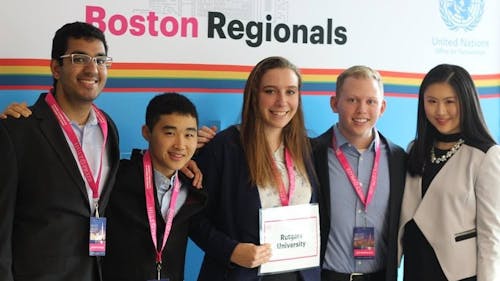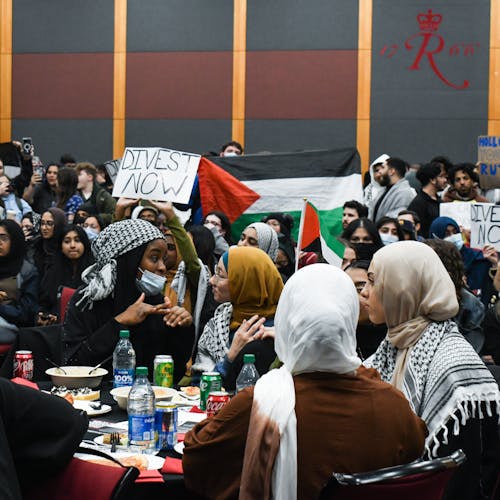2 student groups from Rutgers win Hult Prize Regional Competition with new technology to approach water scarcity

For approximately a decade, the Hult Prize has been awarded to masterminds and innovators that understand the power of a single idea. This year, Rutgers has set a new record by having two teams from the same university as titleholders of the Hult Prize Regionals Competition.
The two teams, SULIS and LivingWaters, are collectively comprised of eight Rutgers students who were tasked with the 2018 Hult challenge — employing the power of energy to transform the lives of 10 million people by 2025, said Sophia Zhou, the campus director of the Hult Prize at Rutgers.
“In nearly a decade, the movement has deployed more than $50 million of capital into the sector and mobilized more than 1 million young people to rethink the future of business as it continues to breed disruptive innovation on college and university campuses across 100 plus countries. The Hult Prize Foundation (has) been called the ‘Nobel Prize for Students’ and has been featured in a TIME magazine cover story highlighting the ‘Top 5 Ideas Changing the World,’” the Rutgers Business School senior said.
After winning the Hult Prize @ Rutgers University competition in December, team SULIS moved on to the Boston regional competition this week and captured the award there as well — beating teams from Yale University, Brown University, Harvard University, New York University and others.
Four Honors College students joined forces to create SULIS — Yuki Osumi, a School of Arts and Sciences sophomore, Sarah Pomeranz, a Rutgers Business School sophomore, Anurag Modak, a School of Arts and Sciences sophomore and Arye Mendelow, a School of Engineering senior.
SULIS, which stands for solar ultraviolet light-induced sterilization, is an innovative device that directly harnesses sunlight to generate sanitized water in an energy efficient, affordable way that can be used to service communities around the world that have limited access to clean water or none at all, Zhou said.
“They’re just doing a really great thing. (The members of SULIS) inspire each other to think creatively to think on their feet. They push each other. Their energy, their dynamic. That is why they won. What they’ve done is put one plus one together and gotten three. They are just a force, and they work so well together,” she said.
The second team from the University, LivingWaters, applied through the competition’s online general application pool against 100,000 other applicants and became champions of the Shanghai regional finals, beating more than 50 of the top Asian universities, Zhou said.
Joshua Kao, a Rutgers Business school junior, Jane Peterken, a School of Engineering senior, Thomas Irving, a Rutgers Business School senior and Shrey Ghate, a School of Engineering senior, make up the team, whose work is focused on the global water crisis.
LivingWaters is a cost effective, DIY unit that harvests heavy rainfall to hydrate the millions within international water stressed zones. The rainwater is captured and filtered, and then is generated into a self-replenishing supply of clean rainwater right at the door steps of those who need it.
Each team has specific regions it hopes to impact with its work. SULIS has pilot locations in Puerto Rico and West Bengal, India, while LivingWaters is targeting Kenya. Zhou said that the team members have already visited those places and understand the culture and needs of the communities there, which she thinks gives them a leverage in the competition.
“If you’re not from the area, it makes it 10 times harder to help the people you’re trying to help,” she said.
Modak, the chief executive officer of SULIS, said that his journey through the competition has been surreal and his decision to apply came from a personal sector of his life.
“As I am from West Bengal, India, I have seen how impoverished people in the rural areas of the state can be. My goal with SULIS is to provide the people with the tools to empower themselves and to generate sanitized water on their own so that they are not dependent on external agencies for clean water,” he said. “By uplifting them, we can allow them to focus on other pursuits, such as education and employment.”
The two teams will now advance to the summer accelerator, a program in the United Kingdom that Zhou described as intensive as a reality TV show.
The eight week program starts with 30 teams that will receive mentorship and strategic planning advisory and go through rigorous curriculum as they create prototypes and start to launch their business ideas. The teams then battle for a chance to be 1 of just 6 finalists at the end of the summer that move on to the final international segment of the competition — their business pitch at the United Nations for the chance to win $1 million for their startup.
Zhou said the UN and the Hult Prize have a partnership and that every year the Hult Prize aligns its case challenges with the UN sustainable development goals. The finalists will be presenting their projects during the General Assembly week in September.
This all started at Rutgers. Forming the teams to compete at the University level was a demanding task, Zhou said. As campus director, she established an organizational team to market the competition, spark the desire of involvement from students and garner judges to pick the best teams. Zhou and her team reached out to Residence Life, the Rutgers Business School, the School of Engineering, the Honors College and even held information sessions to gain publicity for the competition.
Speakers at this year’s information session included last year’s winners.
Rutgers is no stranger to the Hult Prize. Last year, team Roshni Rides, was presented the $1 million by former President Bill Clinton. Their project posed the idea of using rickshaws fueled by electricity instead of natural gas, according to the Rutgers Business School website.
The Honors College hit the jackpot this year of being home to all four members of the winning team, SULIS.
Modak said that the Honors College social innovation lab aims to foster collaboration among students and become the crossroads of intelligence, innovation, social change and pioneer movements that affect the masses.
“Its very goal is to create real change in the world,” he said.
Mukesh Patel, director of the Innovation Lab at the Honors College, a professor in the Rutgers Business School and a faculty advisor to both teams, truly led a network of collaborative support, Zhou said.
“He has been the key person in driving SULIS and mentoring LivingWaters,” she said.
Zhou went on to name a few other professors who have helped drive the teams to success.
“These are the people that will be there to help you and sit with you to get coffee one on one. These are the people who will always say yes because they care that much,” she said.
Zhou said that the Honors College’s social innovation lab breeds a wide range of different minded individuals to come together to make a change.
“(SULIS and LivingWaters are) from very different backgrounds. They’re from (the) School of Engineering, they have business, they have accounting and Chinese minors. The diversity in that of itself really is what cultivates it. Putting people from diverse backgrounds together and creating an idea for the good ... that’s really what the Hult Prize is,” she said.



